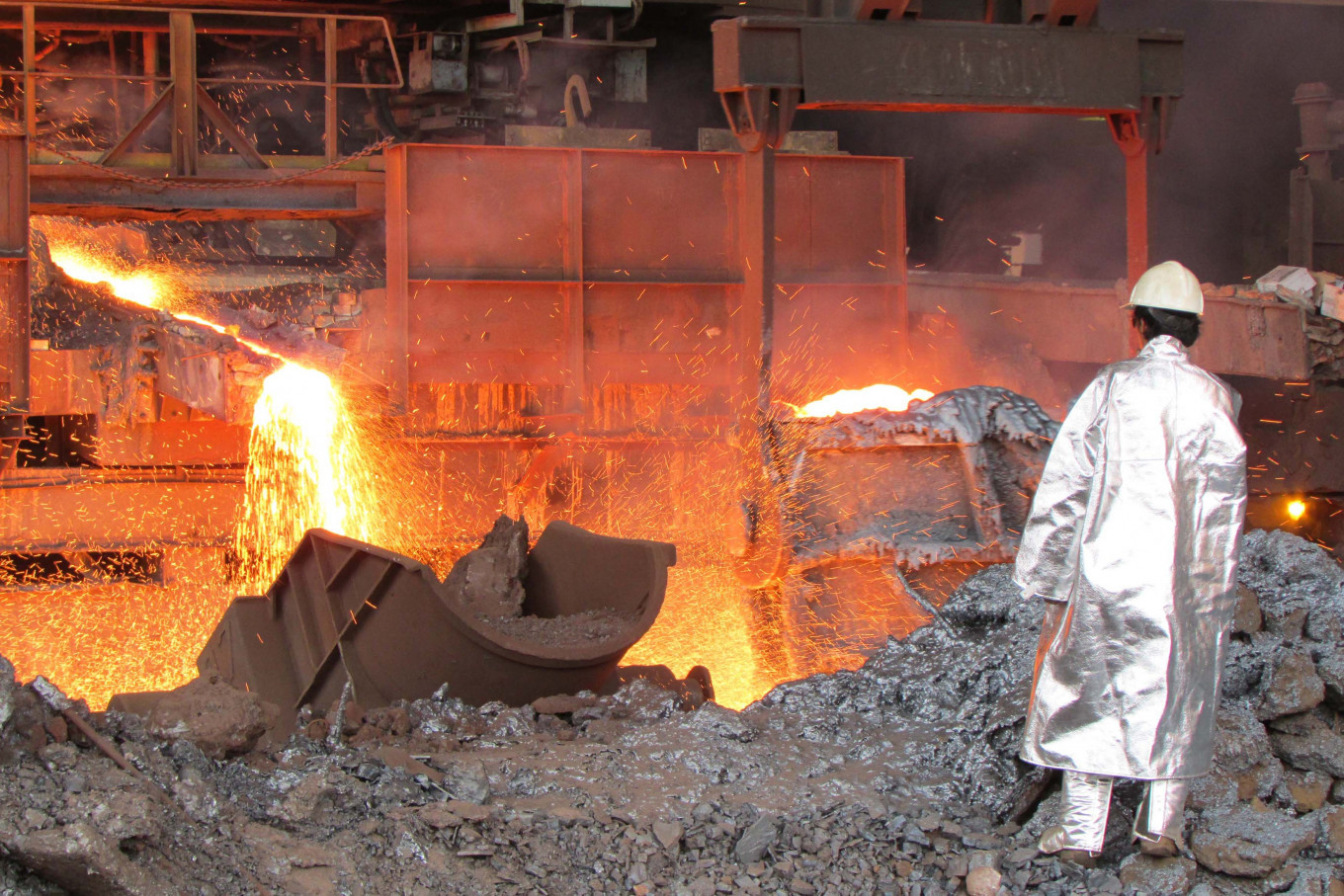RI unconcerned about possible WTO defeat on nickel exports
Trade Ministry International Trade Negotiations Director General Djatmiko Bris Witjaksono insists Indonesia could appeal a WTO decision or use other means to protect its strategic interests.
Change Size

V
arious stakeholders appear unconcerned about the prospect of a possible defeat for Indonesia at the World Trade Organization after President Joko "Jokowi" Widodo revealed the country may lose a dispute with the European Union over nickel exports.
Trade Ministry International Trade Negotiations Director General Djatmiko Bris Witjaksono noted that disputes were “common” in international trade and that Indonesia could appeal or use other means to support its strategic interests.
The important thing was not whether Indonesia would win or lose, he said, but to what extent the government could sustain the "policy platform regime."
“The final [work] of the panel is still in progress. Let’s wait and see how this turns out,” Djatmiko told The Jakarta Post on Monday.
To initiate the WTO dispute, the EU addressed a so-called request for consultations to Indonesia in November 2019 over restrictions imposed by the latter on the export of raw materials like nickel, which is required for stainless steel production.
Brussels argued that Indonesia’s curbs on nickel exports violated Article XI:1 of the 1994 General Agreement on Tariffs and Trade (GATT).
As the negotiations broke down, the EU requested in January 2021 that a WTO panel settle the dispute.
Earlier this month, just weeks before the panel is expected to publish its final report, namely in the fourth quarter of 2022, President Jokowi announced that Indonesia was now able to produce higher-value products thanks to building downstream processing capacity.
"It looks like we're going to be defeated [by the EU] at the WTO, but that’s fine, because the industry has already been developed. It is fine, we do not need to be afraid; it is alright to lose," the President said in a forum held by the Institute for Development of Economics and Finance on Sept. 7.
Read also: RI foreign trade shows no sign of slowing down
At the 25th ASEAN Investment Area Council Meeting, Investment Minister Bahlil Lahadalia told participants that “not all countries in the world” were keen to see economic development in the region, citing the nickel dispute as a case in point.
“Indonesia is currently facing this [pressure]. We are focusing on our nickel downstreaming, [...] and then those countries challenge us at the WTO. This is just a small example […], but other countries could face the same fate,” Bahlil said in Siem Reap, on Sept. 14.
He urged the regional organization to formulate a “common priority” that considers the comparative advantage of each member state, as such measures could increase the region’s “bargaining power” on the global stage.
The ASEAN Investment Report 2022 published recently by the United Nations Conference on Trade and Development (UNCTAD) calls for the region to adhere to and strengthen the commitments made under the ASEAN Investment Facilitation Framework.
“I believe we are strong, but we have not yet put faith in ourselves about the necessity to strengthen fellow member states. I appreciate the insight from UNCTAD in that reform in various regulations and services is fundamental,” Bahlil continued.
Industry Minister Agus Gumiwang Kartasasmita hailed the success of nickel export restrictions by stating that the production of processed nickel had increased the value of nickel-related exports 19-fold over the course of six years.
Indonesia exported processed nickel goods worth US$12.3 billion from January to August 2022, Statistics Indonesia (BPS) data show, which is around 47 percent higher than the total shipped abroad in the whole year of 2021 and 262 percent higher than in 2019, when ore exports were still allowed.
“The government continues to spur the growth of the smelting industry, which is proven to provide a broad multiplier effect for the national economy,” Agus said in Jakarta on Sept. 18.
Read also: WTO director-general knocks G20 heads together
Nickel matte producer PT Vale Indonesia president director Febriany Eddy said nickel processing for electric vehicles (EVs) would not be affected by the WTO decision, as the low price of limonite nickel, the type used for batteries, was not commensurate with the rising transportation cost to ship it overseas.
The construction of high-pressure acid leaching (HPAL) smelters for the production of EV batteries, she added, would not be hindered, as long as energy and transportation costs in Indonesia remained competitive.
“I believe that downstreaming did work here, and now we need to build more HPAL smelters to [make] raw materials for EV batteries,” Febriany told reporters on Sept. 13.
Vale Indonesia finance director Bernardus Irmanto said the firm’s concern was that, if export restrictions for nickel ore were lifted, that could reduce the price of nickel in the global market.
Nonetheless, the current market's direction and competitiveness of nickel ore were still supportive of domestic nickel downstreaming, he said, as overseas processing of saprolite was "not more competitive."
"If saprolite is exported overseas to be processed [...] then there will be oversupply in the next few years," Bernardus told the Post on Monday.
Previously, he said exporting saprolite would only be profitable if the price was above the benchmark mineral prices (HMP).
State-owned Bank Mandiri commodities expert Ahmad Zuhdi Dwi Kusuma said that being forced to lift its nickel ore export restrictions could leave Indonesia in a less advantageous position in negotiations on downstream investment.
In the short term, Europe could see renewed investment in the nickel-processing industry, but the government could try to raise export duties to make the production price in Europe uncompetitive.
"They could argue that Indonesia is hindering the export of important materials to Europe, but this nickel is still owned by Indonesians, so the regulations regarding the transfer of these goods are made by Indonesians," Ahmad told the Post on Monday.









